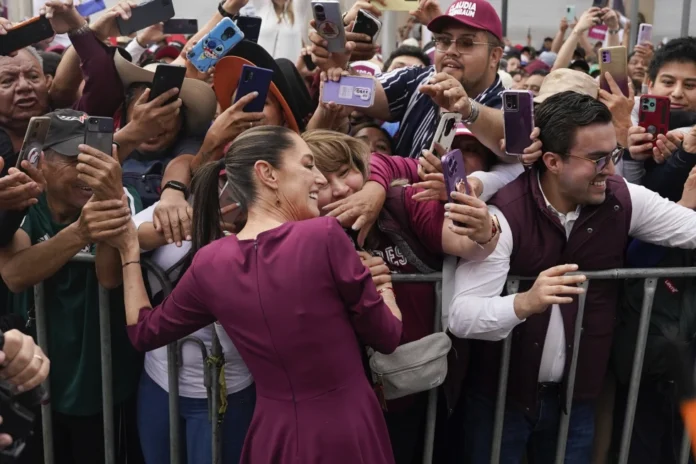Mexico City (BERITAPOLITIK.ONLINE) — Mexico stands at the brink of history as it gears up for potentially electing its first female president.
Claudia Sheinbaum, the candidate representing the ruling-party, currently leads the polls as the nation inches closer to the June 2 election. Notably, the second-place contender is also a woman, leaving little room for a male candidate from a smaller third party to secure victory.
With President Andrés Manuel López Obrador ineligible for reelection due to legal constraints, Sheinbaum emerges as the prominent figure running under his Morena party. Meanwhile, businesswoman, senator, and Indigenous Affairs official Xóchitl Gálvez faces an uphill battle, bolstered by a coalition of major opposition parties.
Sheinbaum, the former mayor of Mexico City, boasts a distinguished background in energy engineering and a lengthy tenure in leftist politics. Gálvez, on the other hand, began her journey by assisting her family’s income through the sale of tamales as a young girl, later achieving a degree in computer engineering and establishing her own tech enterprises.
As the nation awaits the outcome, critical issues and high stakes define the impending election.
How Might Mexico’s Election Impact Migration to the United States?
The majority of migrants entering the United States do so through the borders with Mexico, particularly in Texas, New Mexico, Arizona, and California. Despite lacking legal obligations, Mexico has taken certain measures such as deploying its National Guard to apprehend migrants and accepting the return of non-Mexican migrants passing through to the U.S.
While migration isn’t a primary concern within Mexico itself, there are growing demands for the fair treatment of Mexicans residing in the U.S. The upcoming presidential election in Mexico will grant the next president significant discretion in either discontinuing cooperation with the United States or intensifying efforts to curb northward migration. Any such decision would mark a significant shift, especially considering that migration is already poised to be a crucial issue for the incoming White House administration following the November elections.
Could Mexico’s Election Impact Drug Trafficking Patterns?
Instead of directly confronting drug cartels, President López Obrador has opted for a pragmatic approach by increasing government aid to dissuade potential recruits from joining the cartels as gunmen. However, despite these efforts, many disadvantaged youths, plagued by poverty or addiction, remain susceptible to the allure of violence.
During López Obrador’s tenure, cooperation on anti-drug efforts has been hindered by nationalist sentiments. He has expressed reluctance towards the presence of the DEA in Mexico and denies Mexico’s involvement in the production of fentanyl, a deadly opioid responsible for over 70,000 American deaths annually.
The stance of the next president could potentially exacerbate this situation or lead to increased collaboration, especially as evidence mounts indicating that drug cartels pose a significant threat to domestic peace.
How Mexico’s Election Outcome Could Shape its Economy?

In the past, the United States held significant leverage over Mexico, threatening border closures for political leverage. However, the dynamics have shifted drastically since then. With the relocation of U.S. appliance, auto-parts, and automotive factories to Mexico, the country has become indispensable to American markets, requiring daily shipments of essential parts.
As President López Obrador highlighted, a closed border would severely disrupt these crucial supply chains. Mexico has ascended to become the United States’ primary trading partner, surpassing even China. The interdependence has grown to a point where the economic relationship between the two countries is deemed “too big to fail.”
Furthermore, Mexico relies heavily on remittances from its citizens living abroad, predominantly in the United States. In the previous year alone, Mexican migrants sent an unprecedented $63.3 billion back home. This figure eclipses revenue from tourism and exports, including oil and manufactured goods.
The forthcoming vote in Mexico bears significant weight on its economy, given these intertwined economic realities.
Mexico’s Upcoming Election: A New Era of Latin Populism?
Latin America has long witnessed shifts from left-wing to right-wing governance and back again. Presidents with pro-Iran or pro-Russia stances, known for their lavish spending, have often been swiftly replaced by neoconservatives, and the cycle repeats.
However, recent months have hinted at a different trend. Two significant events have shaken the region’s political landscape: the resounding reelection of El Salvador’s tough-talking president, Nayib Bukele, and the triumph of libertarian figure Javier Milei in Argentina.
These developments mark a potential disruption to Latin America’s usual political oscillations. With Mexico’s upcoming election, scheduled for June 2, the stage is set for another shift. A victory for Morena could solidify populism’s grip on power for the next 12 years, harking back to the days of charismatic, nationalist leaders who promise extensive state benefits.
While Hungary boasts a populist leader who has held power for nearly 15 years, Mexico’s old ruling party, the Institutional Revolutionary Party (PRI), sets the world record with an uninterrupted 71-year reign.
The outcome of Mexico’s election may not only shape its domestic politics but could also signal a broader trend toward populism across Latin America.
Is the Future of Mexican Democracy at Risk?
President López Obrador has been vigorously attempting to diminish the checks and balances, regulatory oversight, and influence of non-governmental organizations. He has centralized power more than any president since the PRI’s peak in the 1970s, a time he openly admires.
Utilizing the army as his primary tool, López Obrador has expanded its role into various sectors including railways, airlines, airports, and hotels. Unlike in many other Latin American countries, Mexico’s army has abstained from political involvement since the 1940s. However, concerns linger that the continued dominance of the Morena party could disrupt this historical detachment.
As the current president nears the end of his term, he leaves behind a plethora of ambitious, unfinished projects, obligations, and debt. Despite López Obrador’s vow to withdraw entirely from politics post-presidency, few believe that a man who has dedicated every waking moment of the past 30 years to his political ambitions will relinquish power so readily.”






